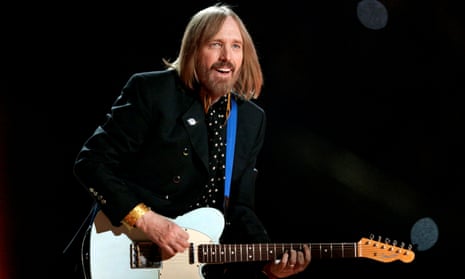The family of rock star Tom Petty have said they hope his death from a drug overdose might spark new debate about America’s “opioid crisis” and that by being transparent, lives can be saved in the future.
Petty died at the age of 66 after suffering a cardiac arrest at his Malibu home in October. A coroner’s report has now revealed that Petty died of an accidental drug overdose, with a mix of prescription painkillers, sedatives and an antidepressant being found in his system.
At the same time Petty’s wife and daughter, Dana and Adria, posted more personal details on Facebook in the hope it could prevent deaths in the future.
“We hope in some way this report can save lives,” they wrote. “Many people who overdose begin with a legitimate injury or simply do not understand the potency or deadly nature of these medications.”
Petty’s is the latest high-profile death involving painkillers. Two years ago Prince died after accidentally overdosing on fentanyl, a synthetic painkiller substantially stronger than heroin. They are names on a tragic celebrity list which includes Elvis in 1977 and Heath Ledger in 2008.
The Centers for Disease Control and Prevention has warned that the US is “in the midst of an opioid overdose epidemic”. It said 42,000 people were killed in 2016 by opioids, which can include heroin, more than any other year on record. Prescription opioids were involved in 40% of those deaths.
A statement from the Los Angeles County coroner’s office said Petty died from “multisystem organ failure due to resuscitated cardiopulmonary arrest due to mixed drug toxicity”. Many of the substances found in his system occur in prescription drugs, a spokesman said.
Petty’s family said they knew before the coroner’s report that he had been prescribed various pain medications, including fentanyl patches.
“Unfortunately Tom’s body suffered from many serious ailments including emphysema, knee problems and most significantly a fractured hip.
“Despite this painful injury he insisted on keeping his commitment to his fans and he toured for 53 dates with a fractured hip and, as he did, it worsened to a more serious injury.”
They said on the day he died Petty was informed his hip had become a full on break. “It is our feeling that the pain was simply unbearable and was the cause for his over use of medication.”
The growth in deaths from painkiller overdoses is particularly acute in the US. But alarm bells are also ringing in the UK. In the first eight months of last year at least 60 drugs deaths were linked to fentanyl, according to the National Crime Agency.
Petty’s family said there may now be further debate on “the opioid crisis and we feel that it is a healthy and necessary discussion”.
A news report about the need for further debate was retweeted by Kellyanne Conway, a senior adviser and counsellor to Donald Trump.
Petty had performed with his band the Heartbreakers since 1976. After his death Bruce Springsteen said: “He was just a lovely guy who loved rock’n’roll and came up the hard way.”
His hits included American Girl, Don’t Come Around Here No More, Mary Jane’s Last Dance and Free Fallin’. He and his band sold more than 80m records and they were inducted into the Rock and Roll Hall of Fame in 2002.
Petty had previously suggested that the tour could be his last, telling Rolling Stone in an interview: “We’re all on the backside of our 60s. I have a granddaughter now I’d like to see as much as I can. I don’t want to spend my life on the road. This tour will take me away for four months. With a little kid, that’s a lot of time.”
His family said they now knew for certain that “he went painlessly and beautifully exhausted doing what he loved the most, for one last time, performing live with his unmatchable rock band for his loyal fans on the biggest tour of his 40 plus year career. He was extremely proud of that achievement in the days before he passed.”
